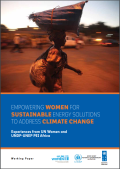
Africa has enormous potential for clean energy, given its ample resources of hydro, solar, wind and geothermal power. However, current highly centralized energy systems often benefit the rich and bypass the poor. On the other hand, decentralized renewable energy systems offer a great opportunity for women’s empowerment. As these are deployed at the local level, women are more likely to participate in related decision-making and be involved in the energy value chain.
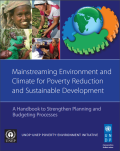
This Handbook is designed as guidance for policymakers and practitioners to mainstream pro-poor environment and climate concerns into planning, budgeting and monitoring. Mainstreaming is achieved by putting poverty-environment issues at the heart of government—in other words, by taking these issues into mainstream economic decision-making processes, particularly the national and subnational planning and budgeting processes led by ministries of finance, planning and local government,and supported by ministries of environment.
Over the last 10 years, the Poverty-Environment Initiative, a joint programme of the United Nations Development Programme and UN Environment, has successfully supported the integration and implementation of pro-poor, environmental sustainability objectives into national, subnational and sectoral development policies, plans and budgets to contribute to poverty alleviation and an inclusive, green economy. The Handbook provides guidance and concrete examples from PEI experience in Africa, Asia-Pacific, Europe and the Commonwealth of Independent States, and Latin America and the Caribbean, as well as from other initiatives.
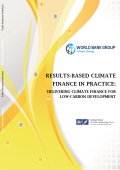
This report reviews 74 results-based climate financing (RBCF) programs implemented in developing countries with an objective to assess the characteristics and overall volume of funding flowing through RBCF programs, describe the various approaches to designing and implementing RBCF programs, and compare practical experiences with applying RBCF with the existing theory and literature.
The report finds that RBCF can: facilitate carbon pricing and market building, support host countries' policy processes to achieve their NDCs, and leverage private sector activity and financing. RBCF can thus play a critical role in mobilizing the resources and supporting the policies and actions needed to achieve the objectives of the Paris Agreement.
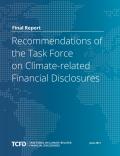
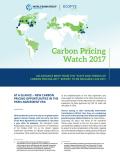
The report is a one stop shop for learning about key developments and prospects of existing and emerging carbon initiatives. There is a continued momentum for carbon pricing. As of 2017, over 40 national and 25 subnational jurisdictions representing almost a quarter of global greenhouse gas emissions are putting a price on carbon. Over the past decade the number of jurisdictions with carbon pricing initiatives have doubled. On average, carbon pricing initiatives cover about half of the emissions in these jurisdictions, which translates to a total coverage of about 8 Gigatons of carbon dioxide or about 15% of global emissions (a fourfold increase over the past decade).
